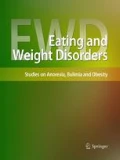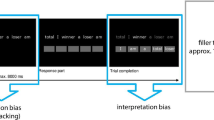Abstract
The aims of the study were to test the hypotheses that some symptoms of starvation/severe dietary restraint are interpreted by patients with eating disorders in terms of control. Sixty-nine women satisfying the Diagnostic and Statistical Manual of Mental Disorders - IV edition (DSM-IV) criteria for a clinical eating disorder and 107 controls participated in the study. All the participants completed an ambiguous scenarios paradigm, the Eating Disorder Examination Questionnaire (EDE-Q) and the Beck Depression Inventory (BDI). Significantly more eating disorder patients than non clinical participants interpreted the starvation/dietary restraint symptoms of hunger, heightened satiety, and dizziness in terms of control. The data give further support to the recent cognitive-behavioural theory of eating disorders suggesting that eating disorder patients interpret some starvation/dietary restraint symptoms in terms of control.
Similar content being viewed by others
References
Keys A., Brozek J., Henschel A., Mickelsen O., Taylor H.L.: The biology of human starvation. Minneapolis, University of Minnesota Press, 1950.
Garner D.: Psychoeducational principles in treatment. In: Garner D.M., Garfinkel P.E. (Eds.), Handbook of treatment for eating disorders. New York, Guilford Press, 1997, pp. 145–147.
Shafran R., Fairburn C.G., Nelson L., Robinson P.H.: The interpretation of symptoms of severe dietary restraint. Behav. Res. Ther., 41, 887–894, 2003.
Fairburn C.G.: Eating disorders. In: Clark D.M., Fairburn C.G. (Eds.), Science and practice of cognitive behaviour therapy. Oxford, Oxford University Press, 1997, pp. 209–241.
Russell G.: Bulimia nervosa: an ominous variant of anorexia nervosa. Psychol. Med., 9, 429–448, 1979.
Fairburn C.G., Bohn K.: Eating disorder NOS (EDNOS): an example of the troublesome “not otherwise specified” (NOS) category in DSM-IV. Behav. Res. Ther., 43, 691–701, 2005.
Fairburn C.G., Shafran R., Cooper Z.: A cognitive behavioural theory of anorexia nervosa. Behav. Res. Ther., 37, 1–13, 1999.
Fairburn C.G., Cooper Z., Shafran R.: Cognitive behaviour therapy for eating disorders: a “transdiagnostic” theory and treatment. Behav. Res. Ther., 41, 509–528, 2003.
American Psychiatric Association. Diagnostic and statistical manual of mental disorders, 4th ed. Washington, D.C., American Psychiatric Association, 1994.
First M.B., Spitzer R.L., Gibbon M., Williams J.B.W.: Structured Clinical Interview for DSM-IV Axis I Disorders (SCID-CV). Washington, D.C., American Psychiatric Press, 1997.
Fairburn C.G., Beglin S.J.: Assessment of eating disorders: interview or self-report questionnaire? Int. J. Eat. Disord., 16, 363–370, 1994.
Fairburn C.G., Cooper Z.: The eating disorder examination, 12th ed. In: Fairburn C.G., Wilson G.T. (Eds.), Binge eating: nature, assessment, and treatment. New York, The Guilford Press, 1993, pp. 317–360.
Wilfley D.E., Schwartz M.B., Spurrell E.B., Fairburn C.G.: Assessing the specific psychopathology of binge eating disorder patients: interview or self-report? Behav. Res. Ther., 35, 1151–1159, 1997.
Carter J.C., Aime A.A., Mills J.S.: Assessment of bulimia nervosa: a comparison of interview and selfreport questionnaire methods. Int. J. Eat. Disord., 30, 187–192, 2001.
Luce K.H., Crowther J.H.: The reliability of the Eating Disorder Examination-Self-Report Questionnaire Version (EDE-Q). Int. J. Eat. Disord., 25, 349–351, 1999.
Beck A.T., Ward C.H., Mendelson M., Mock J., Erbaugh J.: An inventory for measuring depression. Arch. Gen. Psychiatry, 4, 561–571, 1961.
Butler G., Mathews A.: Cognitive processes in anxiety. Adv. Behav. Res. Ther., 51–62, 1983.
Cooper M.: Bias in interpretation of ambiguous scenarios in eating disorders. Behav. Res. Ther., 35, 619–626, 1997.
Vitousek K., Watson S., Wilson G.T.: Enhancing motivation for change in treatment-resistant eating disorders. Clin. Psychol. Rev., 18, 391–420, 1998.
Author information
Authors and Affiliations
Corresponding author
Rights and permissions
About this article
Cite this article
Dalle Grave, R., Di Pauli, D., Sartirana, M. et al. The interpretation of symptoms of starvation/severe dietary restraint in eating disorder patients. Eat Weight Disord 12, 108–113 (2007). https://doi.org/10.1007/BF03327637
Received:
Accepted:
Published:
Issue Date:
DOI: https://doi.org/10.1007/BF03327637




